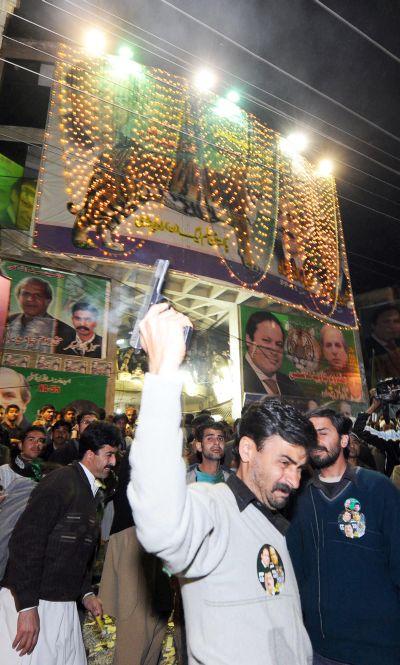|
|
| Help | |
| You are here: Rediff Home » India » News » First Look |
|

Early trends in Pakistan's general elections, marred by low voters' turn-out, went against President Pervez Musharraf [Images] with one of his former ministers losing and another trailing.
Coverage: Pakistan Votes
Initial indications showed Pakistan People's Party of its slain leader Benazir Bhutto [Images] and Nawaz Sharif's Pakistan Muslim League (N) doing well in their respective strongholds Sindh and Punjab respectively while Muttahida Quami Movement was faring well in Karachi as counting of votes was underway.
Zubaida Jalal, a former minister in Musharraf's cabinet, was defeated as an independent candidate for the National Assembly from Kech-Gwadar in southwestern Balochistan province by Yaqub Bizenjo of Balochistan National Party-Awami. She was the education minister during 1999-2001.
Musharraf's confidante and high-profile former minister Sheikh Rasheed Ahmed trailed in a prestigious seat in Rawalpindi.
Ruling PML-Q's Rasheed, a seven-time winner from his constituency and a former railway minister in the Musharraf government, is behind PML-N's Javed Hashmi in one of the two prestigious seats in Rawalpindi.
According to other unofficial results aired by domestic television channels, PPP's Najmuddin Khan won from Dir district in the North West Frontier Province.
Sharif told an Indian TV channel that he was happy with the election trends.
The Election Commission is yet to officially announce the turn-out or any of the results though television channels have been reporting unofficial trends in national and provincial assembly seats across the country.
Earlier in the day, the balloting saw low turn-out of the electorate apparently due to fear and apathy under the shadow of violence.
No official figures about the turnout were available but observers said it would be less than the 42 per cent recorded in the 2002 polls.
A large number of people went to polling stations in the final hours before the voting ended at 5 pm (5.30 IST) to exercise their franchise.
Though the fear of violence had loomed large over the elections to the national and four provincial assemblies, the process was largely peaceful in most parts of the country, barring stray incidents of violence involving workers of political parties in Sindh and Punjab provinces and sporadic militant attacks in the northwestern areas.
At least six people were killed in Punjab province, the political heartland of Pakistan, in political clashes. One person was killed in a bomb blast in Quetta while another died in a clash at Mansehra in North West Frontier Province.
Militants in the restive northwestern areas attacked polling stations with bombs and rockets, though there were no casualties, officials said.
There were also reports of people being intimidated and prevented from voting in some places. At Badin in Sindh, some persons allegedly snatched polling materials and forcibly stamped ballots. At Bannu in NWFP, militants kidnapped some poll officials.
Image: A supporter of the Pakistan Muslim League-Nawaz fires in the air in celebration after hearing the preliminary results in Rawalpindi.
Photograph: Aamir Qureshi/AFP/Getty Images
Also Read:
Musharraf heading for a painful end: Hamid Mir
PPP awaits results with fear and expectation
Inside Karachi: 'Election won't change anything'
Pakistan elections: Keeping fingers crossed
|
|
| © 2008 Rediff.com India Limited. All Rights Reserved. Disclaimer | Feedback |